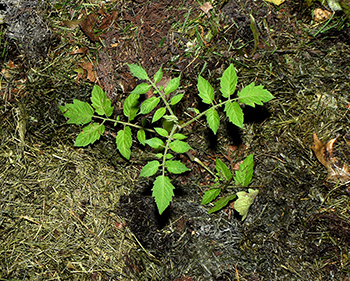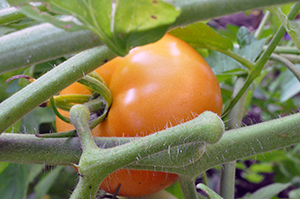Summer Vegetable Care
by Dennis Patton, horticulture agent
Vegetable gardens can be found in backyards across the city. No matter how big or small the garden, vegetables will produce better with just a little care.
Stay on top of the weeds
Weeds quickly grow and can choke out the vegetables. Weeds are easiest to eradicate while small. The bigger they get the more they outcompete your plants for water, nutrients and sunlight, taking a toll.
Weeds can be removed by hand or a light cultivation. Chemical herbicides are available but usually are not necessary for small plantings. These products are a tool, but good cultural practices should be the first defense.
Mulch is the gardeners friend Mulch is the unsung hero in a vegetable garden. We often think of mulching our landscape beds but many gardeners overlook the value in the vegetable garden. Mulch is your best defense against weed growth. It also reduces water loss and keeps the soils cooler helping to develop strong roots.
Mulch is the unsung hero in a vegetable garden. We often think of mulching our landscape beds but many gardeners overlook the value in the vegetable garden. Mulch is your best defense against weed growth. It also reduces water loss and keeps the soils cooler helping to develop strong roots.
The best mulches in a vegetable garden are those that last just one season. Grass clippings, shredded leaves saved from fall or straw work great. The mulch layer should be about three inches deep and cover all the open soil areas. Materials that break down as the season progresses create additional organic matter to improve the soil and can be simply worked into the ground at the end of the season. This gives you a leg up on the start of the next year.
Other mulches can be used such as wood chips which are traditionally used in the landscape. The issue is these materials do not break down rapidly. If they get incorporated into the soil as they decompose they rob the nitrogen available to plants. This tie-up of nitrogen usually reduces growth unless more is applied.
Even moisture
Since vegetables have a short season to produce it is important that they have continual growth. Plantings that are stressed will set less fruit and have lower quality. Summers can be hot and dry which is not a good combination.
Vegetable gardens do best with about one inch of water per week. This keeps the upper level of the soil moist where the majority of the roots are located. There are several ways to water. Pick the option best for you. But here are some tips to keep in mind. Moisture on the foliage for long periods of time can cause more diseases especially with tomatoes. It is best to water early so foliage has time to dry before nightfall. Another way to avoid wetting the foliage is to use surface irrigation. This can range from a drip system or simply letting the hose flood around the base of the plants.
Harvest timely Life gets busy but don’t forget to harvest the fruits of your labor. Lack of picking reduces the plant's ability to set additional fruits. What’s better during summer than bringing in a basket of fresh picked vegetables for the table?
Life gets busy but don’t forget to harvest the fruits of your labor. Lack of picking reduces the plant's ability to set additional fruits. What’s better during summer than bringing in a basket of fresh picked vegetables for the table?

